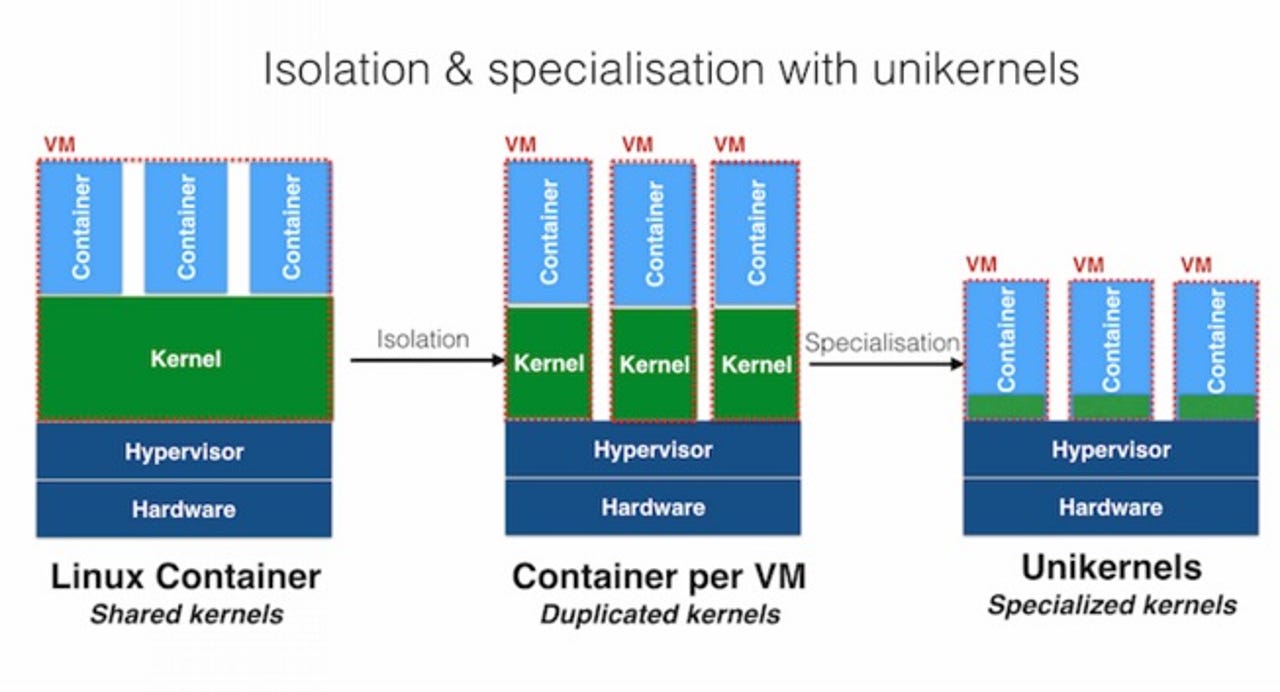Docker's Unikernel acquisition: The Microsoft angle

When Docker bought Unikernel Systems in late January, I immediately began wondering about the possible implications of the deal for Microsoft.

It's no secret that Docker and Microsoft have been working increasingly closer over the past couple of years. And unikernel operating systems are important in the Internet of Things (IoT) space, which is a market of keen interest to Microsoft.
But there's yet another reason I was interested: Microsoft's Drawbridge is considered a unikernel operating system, and is listed among the projects on the Unikernel.org site. Unikernels are specialized operating system kernels written to act like individual software components. (For a good unikernel primer, check out this ACM article.)
I asked Microsoft officials if they'd talk about what Docker's Unikernel acquisition might mean, if anything, for Microsoft. I was told no one at Microsoft would comment.
Docker officials also, understandably, wouldn't comment on what Docker's acquistition might mean for Microsoft. But they did talk a bit about why they bought Unikernel and how those of us keeping tabs on all things Docker-related might think about this space moving forward.
Docker is an open source engine that automates application deployment. Docker uses containers, in lieu of virtual machines, to enable multiple applications to be run at once on the same server. Microsoft has made it possible for users to run Docker apps on Linux on Azure. More recently, Microsoft has partnered with Docker to bring Docker support to Windows Server.
"We see unikernel on the continuum of containers," said Docker Vice President of Enterprise Marketing David Messina. "And unikernels are very important in the world of microservices."
Unikernels have been of interest to a number of embedded-device vendors building networking routers, storage devices and the like. Ultimately, they'll also likely figure in cloud workloads, too, as unikernels potentially allow developers to build applications smaller and more securely, Docker officials believe.
As unikernel systems haven't had consistent, robust tooling, this is where Docker fits in, Messina said.
The idea of splitting the OS into libraries that developers can use, thus "democratizing system programming," is important to where containers and unikernel technology are going, added Patrick Chanezon, a member of the Docker technical staff and formerly a Director of Enterprise Evangelism at Microsoft.
Drawbridge, the Microsoft Research library OS project, doesn't seem to be active any longer, at least based on the company's Drawbridge page on Microsoft Research. But Microsoft has used some of the concepts from Drawbridge (such as isolation primitives) in crafting the containers it is building into Windows Server 2016, officials have said previously.
Microsoft officials have talked up the company's coming Hyper-V containers as offering an additional layer of isolation. In the Docker-supplied diagram embedded above in this blog, the shared container approach in the middle of the diagram is akin to what Microsoft is doing with Hyper-V containers.
Could Microsoft do more with Docker as the latter moves ahead with more unikernel-focused technologies? I'd say the possibility is there. It will be interesting to see if the pair make any announcements together in this space in the coming months....